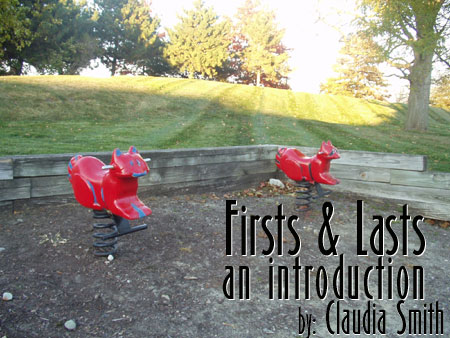 |
|
| archives print (dis)likes links readings submit news | |
November '05 -- guest edited by Claudia Smith
![]()
Learning to Ride a Bicycle
by Amanda Deutch
Iceland
by Dorothee Lang
Genius
by Terri Brown-Davidson
Kisses on the Forehead
by Liliana V. Blum
translated by Toshiya Kamei
Margaret and Beak Discuss Jazz for the Last Time
by Kathy Fish
Lawrence Welk's Last Erection
by Linda Boroff
The Star
by Bob Arter
Rawhide
by Kim Chinquee

I think my fascination with the way we remember began when I was a junior in college and – let’s call it a rainy day – I was in a used bookstore somewhere in the Hudson Valley. I picked up a dog eared copy of Nabokov’s Speak, Memory. I liked the cover; if my memory is correct, it was a picture of a pinned-down monarch butterfly. I fell in love with it the way I usually fell in love with works of fiction. It jolted my sense of narrative, of what it means to remember, and how we see ourselves as shaped by our past.
I think of “first and last” memories as a construct, a way of framing what happens the way an old Polaroid frames a moment of the past. I remember my first day of kindergarten, looking for Mrs. Foidick’s classroom (yes, that was her name, although I’d have to look at the class picture to get the spelling right), and a big kid pointing to a door. One of those rainbows that were so ubiquitous in the 1970s arched over the door. I remember walking into the room, wondering what to do next. Other children were playing with blocks on a blue shag rug. I was afraid, and suddenly the knowledge that my mother was not here, was nowhere near, could not be called, left me with a tingling in my lower back. Did this really happen? Well, it did – perhaps not all on that day, but it was a first for me, and so it dominates my vision of that time, that place.
As this issue began to take form, I was struck by the way these firsts and lasts break with what I’d originally anticipated. Terri Brown Davidson’s “first” is a story about a woman in the middle of her life, experiencing true artistic inspiration for the first time. Linda Boroff’s “The Last Erection of Lawrence Welk” captures all the fierce brutatlity of young love, and yet has the elegiac feel of a “last.” Firsts and lasts here are not defined by age, by time and place.
I love every story and poem in this issue, and hope you do as well.
